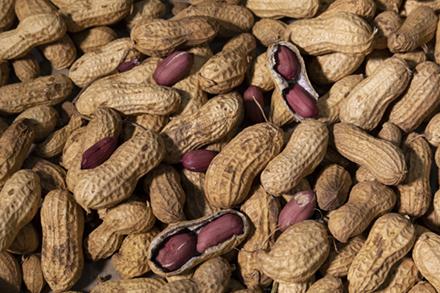ARS Fights To Reduce Peanut Allergies

Smooth or crunchy, salty or sweet, Americans love peanut butter! But not everyone can enjoy this popular treat. According to the Food and Drug Administration (FDA), approximately 1 million children in the United States have an allergy to peanuts. In the past 20 years, peanut allergies have tripled in the United States, said Soheila Maleki, a chemist with the Agricultural Research Service (ARS).
It's not easy living with a food allergy. Peanut allergies are a serious health threat, and consuming even a trace amount has the potential to cause a life-threatening reaction. While the FDA indicates that about 1 in 5 children outgrow their peanut allergy, most who are allergic need to be vigilant in avoiding peanuts for the rest of their lives. However, complete avoidance is not always possible because sometimes trace amounts of peanuts can be present in food products due to accidental cross-contamination.
What you might not know is that ARS is at the forefront of cutting-edge research to improve the quality of life for millions of people with peanut allergies. ARS scientists are researching solutions to prevent or treat peanut allergies and methods to create a safer peanut through food processing and crossbreeding cultivars with naturally lower levels of allergens to develop a hypoallergenic peanut plant.
At the ARS Southern Regional Research Center in New Orleans, LA, a team of ARS researchers, including Maleki, has been involved in ongoing research to:
- develop immunotherapeutic tools for the treatment of peanut and tree nut allergies
- improve diagnostics of peanut and tree nut allergies
- understand the mechanisms of cross-reactivity of peanut-allergic individuals with tree nuts and vice versa
- further characterize the effects of processing on the allergenic potential of peanuts and tree nuts
Along those lines, the research team has looked at what happens to peanuts following different processes—boiling, frying, and roasting. Maleki and colleagues in Spain showed that cooking peanuts under high heat and pressure could reduce allergenic potential, whereas roasting raw peanuts causes them to undergo molecular changes that increase allergenicity. This groundbreaking research showed that food processing methods can also affect the detection of allergens in food.
Another research project, which contributed to a study spearheaded by scientists in the United Kingdom, found that early introduction of peanuts through infant foods can prevent the development of a peanut allergy in 80 percent of susceptible babies. Results of this important research prompted the American Medical Association to revise its guidelines to recommend introducing peanuts early into the diet of infants.
Most recently, the ARS team contributed to the development of a treatment to desensitize peanut-allergic people by having them consume small, increasing doses of peanut proteins over time. The team was successful in helping develop the very first food (in the form of peanut powder) to be characterized as a pharmaceutical for immunotherapy of peanut allergies.
In 2019, Maleki served as a member of the FDA Allergen Product Advisory Panel on peanut allergen powder, and in early 2020 the FDA approved the peanut allergen powder to reduce allergic reactions that occur from an accidental exposure to peanuts.
One of the goals of ARS's research is to improve the quality of life for American consumers, and to that end this valuable research has had a tremendous impact on advances in detection, diagnosis, and treatment of food allergies. It also has the potential for life-changing benefits for people with peanut allergies.—By Nancy Vanatta, ARS Office of Communications.

